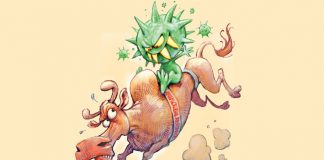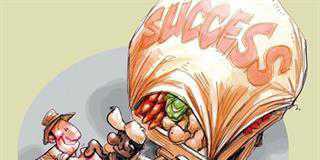Despite 16 years of freedom and democracy, agriculture in South Africa faces many challenges. When it comes to nation-building, we’ve probably gone backwards. We’ve become a nation of numbers – numbers of blacks and whites, urban people and rural people. But we have to realise we’re a country of minorities.
In fact, 45 million minorities. But how do we bring them together in a nation that has become polarised? It’s not easy to build a common identity without losing individual identity. We need to build on common interest. We have National Braai Day in September – but we have to do more! And get beyond black and white.
Thabo Mbeki recently said 60 000 white professionals had left South Africa. This exodus of talent is still happening. And it’s not only whites who are leaving. Seven out of 10 of my final year students emigrate. We also need to unify agriculture agenda, and we need to do so by the first half of next year or we’ll be on the wrong side of public sentiment. I know we’ve tried before. But we haven’t tried hard enough.
So how do you bring people together and build the country? Well, the first thing we need to remember is no country can prosper without a spirit of unity and volunteerism. Where people do things without bribery, or the expectation of anything in return.
My neighbour in Hemel-en-Aarde (near Caledon), decided to do just this, by coaching rugby at a local farm school for one day a week. Six months later, his team played a large neighbouring school – and beat them 25 to 18. “This is how you build a country,” he said. In agriculture every year for the past 10 years, we have lost 1 000 farmers. We had roughly 130 000 farmers 50 years ago – today we have 30 000. How many farmers will we have 50 years from now?
To survive, farmers are having to grow. We’re seeing bigger and bigger farms, and fewer and fewer farmers. Agriculture is going in the direction of “mice and men”. The “mice” will disappear. The problem is, even the “men” are struggling. About 70% of commercial farmers are making enough to just cover their costs. Agriculture has to come up with a serious growth strategy. Markets will be bigger, but we don’t know how agriculture will grow to supply them. We have to find a way of channelling resources towards us.
Agriculture also has to have an African agenda. We need to get resources from up north, not chase farmers there. Of course there are opportunities there, but we have to develop them in line with our own interests.There are only two places in the world with enough resources to grow – Brazil and Africa. Brazil is about 20 years ahead of us in terms of development and it’s time for South Africa to start a massive growth strategy. But has anyone put one on the table?
People and nature
Unlike other sectors, agriculture can employ large numbers of unskilled and semi-skilled labour. If we include the food chain in production we could approximate 15% of GDP. That makes agriculture a bigger employer than mining. But it’s not right that farm labour should be the lowest-paid and the lowest social slot in society. A country that allows that can’t have a future. At the same time, we must be careful when it comes to the widespread commercialising of small-scale agriculture.
Small-scale farming has a place in the country. It doesn’t exist to produce surplus production, but as a welfare safety net, to maintain a rural lifestyle.
It’s the incubator of values. Kids who have grown up in urban areas have been deprived because they’ve been disconnected from nature. They’re preoccupied with getting rich and living excessively. Kids from farms are just better-mannered. There’s something about growing up with mud between your toes.
Ultimately, nature is our teacher.Our challenge is to get the commercial sector to help develop the small-scale sector, and make sure the next generation of these farmers aren’t malnourished and trapped in poverty. Research in rural KZN shows that 56% of rural people lack food security. They don’t eat enough to fulfil their energy requirements.
Ecology is also part of the new agriculture agenda. Water is getting scarcer and it’ll have to be carefully managed. Already, there’s not enough water for agriculture. In the past, farmers were perceived as custodians of nature, but these days we’re often seen as the polluters, who take more out of the earth than we replenish. We have to prove to society that we really are the custodians of the earth and look for more sustainable farming practices to diminish agriculture’s effects on the earth.
We have to put the multi-functionality of agriculture back on the agenda. How big is the subsidy we need to ensure black farmers survive? Because if there aren’t any black farmers, there won’t be any white farmers. Prof Mohammed Karaan is the dean of agrisciences at the University of Stellenbosch and a member of the National Planning Commission.













